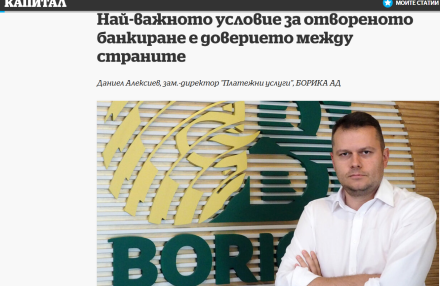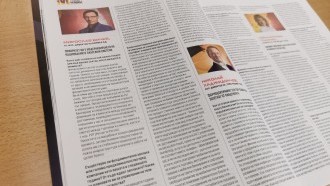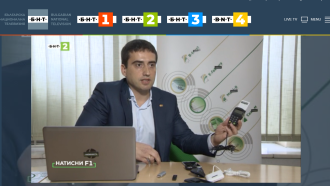Daniel Aleksiev to CAPITAL newspaper: The most important condition for open banking is trust between the parties
Daniel Aleksiev is the Deputy Director of Payment Services at BORICA AD. He has 15 years of experience in banking, most of which working on the development of digital products and services. He joined the Company's team at the beginning of 2020 with the task of creating and developing the Company's strategic InfoPay project in response to the European PSD2 payment directive and the new regulations imposed thereby.
- The PSD2 directive, which concerns payment services, has been heavily discussed in the country in recent years. Tell us briefly about the changes it imposes. What are the novelties in the payments process?
Indeed, in recent years there has been a dynamic in the payments area. And this is no coincidence. Innovative solutions have emerged that have completely changed payment methods and the customer experience. The reason for this is not only the natural evolution of technology, but also the liberalisation of the financial sphere, which is underpinned by the revised PSD2 Directive, effective from September 2019. PSD2 aims both to promote competition and stimulate innovation in the payments industry, and to regulate the rights and obligations of providers and consumers. An essential element of the Directive is the issue of increasing the reliability of payments, which is particularly relevant in the ever-expanding online trade. In that regard, BORICA as a card and payment operator has implemented a new version of 3DS and 3D infrastructure that ensure secure payments on the Internet.
When we talk about PSD2 we should also mention the so-called Open Banking, which is regulated through it. Open Banking defines the rules by which new entrants to the payment system, so-called TPPs (third party providers), gain access to customer information provided to them by the banks themselves. It is as a result of these changes that innovative solutions and products are being created that allow end-users to monitor their account information, produce analytics and forecasts, and initiate payments. Consumers are no longer dependent on the bank serving them and the financial technology solutions provided by it, but can also take advantage of external services of licensed payment providers in the EU. All of this happens in accordance with strictly defined rules, without compromising the security of the consumer. Banks are also getting involved in this process and starting to offer solutions using data from other banks. Something that was unthinkable until recently.
BORICA, in its role as a major provider of technology solutions for the banking sector, is very closely following all these changes internationally and developing them for the local market through innovative projects. Such is the current project for instant payments in BGN - Blink, in which all banking and financial institutions in the country participate. An essential part of it is the possibility of payment based solely on a mobile number. BORICA will maintain a central database where there will be a match between the phone number and the IBAN of the recipient. If users are enrolled in the instant payment system, they will be able to pay each other in this way. The link between the telephone number and the IBAN is essentially a precedent for Bulgaria.
- How have the new regulations affected the business environment in the country?
We usually associate regulations with restrictions, but in the case of PSD2 and open banking, I would say that these are regulations leading to innovation. Thanks to the changes imposed, completely new products and services for end users have emerged, new companies have entered, competition has increased. Most importantly, the end user is the main beneficiary of this. At the same time, with the higher security standards adopted for electronic payments, customers will be able to benefit from the innovative services and payments offered online. I would like to point out here that even before the advent of Open Banking, fintech solutions of this type existed on the market. However, these solutions were not regulated by law and raised a number of issues regarding data security, storage location and access, among others. Regulation has addressed all of these issues and created a secure environment where all participants in the process have well-defined roles, rights and obligations, and their activities are regulated by the Bulgarian National Bank.
- It has become clear that financial services are mediated by so-called Third Party Providers (TPPs). What is their role in the process and respectively, yours?
BORICA has always been this type of organization - a technology service provider for the banking industry. We often joke that we are the oldest fintech in Bulgaria. In practice, every single bank client is a user of our services, even though we remain "in the shadows". Therefore, the services we offer in connection with Open Banking are a logical extension of this type of activity.
In the coming years, we will focus our team's efforts precisely on the development of payment fintech services for companies and individuals. The new InfoPay multi-banking platform, which is a natural successor to the InfoBank service we have offered for more than 20 years, is already on the market. Four years ago, BORICA took out a payment institution license and subsequently extended it with two new PSD2 services: 'Payment Initiation' and 'Account Information Provision'. These are reflected in the InfoPay platform, which gives business customers quick and easy access to their financial profile. At any given moment, through a single point, they have aggregated information about their balances and movements in accounts opened with different banks in the country. InfoPay users will be able to order electronic payments to counterparties, purchase goods and pay for services through merchants' websites without the need to use a payment card.
- Tell us what happens when a company decides to become an InfoPay subscriber?
InfoPay customers are in control of their finances 24/7, with information always available in real time. Pre-registration is required to use the service, which can be completed either online or in person at a company sales office. Online registration is at www.infopay.bg, using a qualified electronic signature - hardware or cloud - or video identification provided by BORICA. In-person registration is completed at the company's sales office.
To use the service, customers must have online banking and obtain consent to register accounts with InfoPay from their servicing banks. The consent process is quick, easy and is performed remotely on the platform itself.
The platform can be used either from a desktop computer or through a browser on a mobile device. Each business owner may grant different controlled access to the employees who will be working in the platform, depending on their direct duties, thus adding flexibility to the work process.”
- For which business area is this service most valuable?
I would like to share with you our observations from the pilot phase of InfoPay. It has confirmed the expectation that there will be the strongest interest among accountants and accounting firms. However, we were surprised to find that companies in the country were significantly more active in testing the new service than companies in the capital city. However, we would not want to narrow the circle to a specific area or company size. This is a service that can be used by any company that faces challenges in managing its finances, such as the need to process data quickly, prepare reports and statements within a short period of time, work remotely, minimize routine activities in the work of employees, as well as new logistics and organization of processes within companies. In practice, with automated data processing in InfoPay, we provide companies with a tool to tackle these challenges. Key to the automation of our customers' business processes are the APIs provided by InfoPay to integrate information and account movements directly into the ERP or accounting system of the servce customer company.
- The truth is, Accounting still can't "escape" paper, despite their wish to digitize processes. How will you make your customers choose your e-service?
The last two years have shown us that in extreme situations, digital technology helps and thanks to it we are able to overcome distances and limitations. The new way of working remotely is forcing businesses to go almost entirely digital. This naturally leads to new rules, the need for technical time to adapt to the new reality. We as a business have defined the need in the market and offer a solution that, in our practice so far and from our experience with our current Infobank service, we know works and benefits businesses. Therefore, through InfoPay we are not offering just another electronic service, but a completely new and automated workflow that will allow aggregation of information and analysis of data contained in various documentation, instant access to this data and other capabilities that will benefit business users of the service in the new realities. In the future, we will further enhance InfoPay with payment initiation, aggregated data on a counterparty basis. We will integrate our already popular e-Invoice service directly into InfoPay and this will allow our customers to track payments and payment terms on invoices received and issued. I think that despite the resistance of some people, traditional business processes are moving towards digitalization, and we, in turn, by combining different types of fintech solutions, will continue to assist organizations on their way to implementing electronic management models.
Source. CAPITAL newspaper









